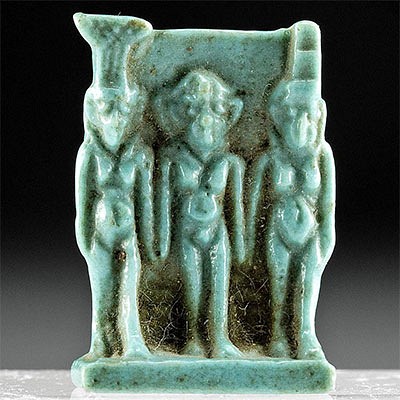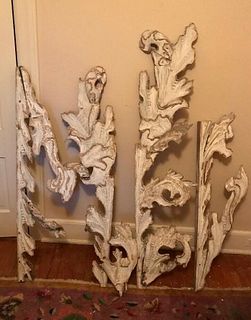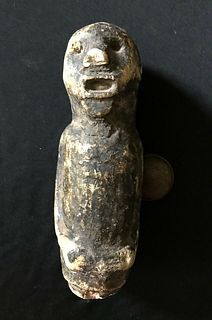2nd C. Gandharan Stucco Head - Bodhisattva / Prince
Lot 70
About Seller
Artemis Fine Arts
686 S Taylor Ave, Ste 106
Louisville, CO 80027
United States
Selling antiquities, ancient and ethnographic art online since 1993, Artemis Gallery specializes in Classical Antiquities (Egyptian, Greek, Roman, Near Eastern), Asian, Pre-Columbian, African / Tribal / Oceanographic art. Our extensive inventory includes pottery, stone, metal, wood, glass and textil...Read more
Estimate:
$3,800 - $5,700
Absentee vs Live bid
Two ways to bid:
- Leave a max absentee bid and the platform will bid on your behalf up to your maximum bid during the live auction.
- Bid live during the auction and your bids will be submitted real-time to the auctioneer.
Bid Increments
| Price | Bid Increment |
|---|---|
| $0 | $25 |
| $300 | $50 |
| $1,000 | $100 |
| $2,000 | $250 |
| $5,000 | $500 |
| $10,000 | $1,000 |
| $20,000 | $2,500 |
| $50,000 | $5,000 |
| $100,000 | $10,000 |
| $200,000 | $20,000 |
About Auction
By Artemis Fine Arts
Aug 5, 2021
Set Reminder
2021-08-05 10:00:00
2021-08-05 10:00:00
America/New_York
Bidsquare
Bidsquare : VARIETY SALE | Antiquities & Ethnographic Art
https://www.bidsquare.com/auctions/artemis-gallery/variety-sale-antiquities-ethnographic-art-7292
Featuring classical antiquities, ancient and ethnographic art from cultures encompassing the globe. Egyptian, Greek, Roman, Etruscan, Near Eastern, Asian, Pre-Columbian, Native American, African / Tribal, Oceanic, Spanish Colonial, Russian, Fossils, Fine Art, more! Artemis Fine Arts info@artemisgallery.com
Featuring classical antiquities, ancient and ethnographic art from cultures encompassing the globe. Egyptian, Greek, Roman, Etruscan, Near Eastern, Asian, Pre-Columbian, Native American, African / Tribal, Oceanic, Spanish Colonial, Russian, Fossils, Fine Art, more! Artemis Fine Arts info@artemisgallery.com
- Lot Description
Central Asia, Northwest Pakistan, ancient region of Gandhara, ca. 2nd to 4th century CE. A striking painted stucco head of a bodhisattva or prince, his attractive visage finely modeled with elegant contours, closed full lips, a philtrum above, somewhat downcast eyes, arched brows leading to an aquiline nose, long earlobes, and a wavy coiffure that is adorned by a headband above a fringe of black scalloped bangs. The head is further embellished with red pigment on the lips and eyes, yellow pigment on the headband, white pigment on the skin, and black pigment on the hair. Size: 5.75" H (14.6 cm); 6.875" H (17.5 cm) on included custom stand.
Bodhisattvas are among the most compassionate beings in the universe, devoting themselves to saving the suffering and helping others achieve enlightenment and Buddhahood. Traditionally depicted as less austere than Buddhas with graceful postures and elegant garments, a nod to the riches of the Northwestern Chinese Silk Road, this piece is no exception. Bodhisattvas or Guanyin are associated with compassion and mercy - their long ears significant, because they rescues all human beings by hearing their cries for help and the sounds of suffering.
Gandharans are famous for schist and stucco carvings, with stucco replacing schist as the dominant material around the 3rd century CE. Vast monastic institutions like those at Takht-i-Bahi, Sahri-Bahlol, Jamal Garhi, Ranigat, and Thareli were decorated by skilled artisans with stucco representations of important figures, religious scenes, and artistic dedications. Stucco allowed artists more freedom in portraying lifelike features, as shown in the gentle curve of the brow here. During this time, Gandhara was exceptionally wealthy, profiting from trade along the Silk Road; patrons had resources to spend on the arts, creating a flowering of stucco artwork. Some monumental statues had stucco hands, feet, and heads alongside clay torsos - the size of these figures was such that clay was needed to maintain their form.
Provenance: private southern California, USA collection, acquired before 2000.
All items legal to buy/sell under U.S. Statute covering cultural patrimony Code 2600, CHAPTER 14, and are guaranteed to be as described or your money back.
A Certificate of Authenticity will accompany all winning bids.
Replace: PLEASE NOTE: Due to recent increases of shipments being seized by Australian & German customs (even for items with pre-UNESCO provenance), we will no longer ship Replace: most antiquities and ancient Chinese art to Australia & Germany. For categories of items that are acceptable to ship to Australia or Germany, please contact us directly or work with your local customs brokerage Replace: firm.
Display stands not described as included/custom in the item description are for photography purposes only and will not be included with the item upon shipping.
#159046A fragment from a larger composition. Repaired from several pieces with visible break lines. Losses to nose, ears, neckline, and verso as shown. Normal surface wear with nicks/chips to brows, cheeks, and other high-pointed areas. Nice remaining red, yellow, white, and black pigment on the hair, hairband, lips, eyes, and face.Condition
- Shipping Info
-
All shipping is handled in-house for your convenience. Your invoice from Artemis Gallery will include shipping calculation instructions. If in doubt, please inquire BEFORE bidding for estimated shipping costs for individual items.
-
- Buyer's Premium



 EUR
EUR CAD
CAD AUD
AUD GBP
GBP MXN
MXN HKD
HKD CNY
CNY MYR
MYR SEK
SEK SGD
SGD CHF
CHF THB
THB














